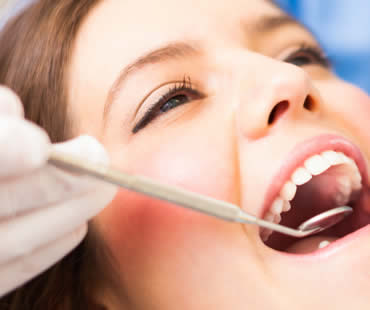
If you have tooth pain or another issue, you might wonder what a visit to the dentist may reveal. You may need a root canal procedure. In order to properly evaluate your issue and to confirm the need for a procedure, a dentist will examine several factors. These typically include the symptoms you are experiencing, the signs observed, and any additional testing required to confirm an initial theory.
You may have noticed:
- You experience average to severe pain that lingers, during or immediately after drinking hot liquids or food, or very cold liquids or foods.
- You have pain, swelling, or sensitivity when biting or chewing on a certain tooth.
- Your tooth pain disrupts your life, preventing you from sleeping through the night or conducting your daily business without taking an over-the-counter pain reliever.
- You have a “bubble” on your gum, similar to a pimple. When irritated, it may release blood or pus that can smell or taste bad.
- You have pain that radiates out from one tooth to other areas of your head or jaw. For example, a tooth pain can lead to a pain behind the eye like a headache or to the ear, resulting in earache symptoms.
- You have a discolored tooth that is darker than the surrounding teeth. A grey tooth can indicate a “dead” tooth.
- You have a broken or cracked tooth with obvious signs of damage or decay.
Your dentist may have noticed:
- A tooth problem revealed by x-rays
- A recurring or persistent gum pimple (also called “fistulous tracts”)
- A tooth that has changed color
Additional testing:
- X-ray examination – if x-rays did not reveal the problem, they can provide an extremely clear picture of tooth health
- Percussion testing – a gentle tapping on the teeth to evaluate pain response
- Thermal testing – a careful application of a hot or cold stimulus to evaluate sensitivity
Sometimes, teeth needing to undergo a root canal procedure have no symptoms discernible to the patient. It is important to visit your dentist regularly to ensure the proper diagnosis and treatment needed to maintain life-long oral health.
If you need root canal treatment in the Fernandina Beach area, contact our office today to schedule a consultation.

If you are about to undergo a dental therapy that necessitates the use of sedation dentistry, especially IV sedation, there are definitely some important questions you should ask your dentist prior to the procedure. Remembering to ask these questions can be difficult, especially if you are feeling anxious or ill at ease with regard to the treatment.
Use this guide to give you some of the most important questions you might not have thought of or remembered to ask:
- What type of sedation will I be receiving?
- What risk factors – even rare ones – are associated with this type of sedation?
- How long will the treatment take, and during how much of that time will I be sedated?
- How will the sedation be administered?
- Who will give me the sedation and monitor it during my treatment?
- What safety measures do you have in place in case of any medical emergency?
- What would happen in the case of a cardiac emergency or a seizure?
- Who is trained in CPR and other life-saving skills?
- What kind of preparations do I need to make prior to my treatment?
- Should someone accompany me to be present during the treatment?
- How soon following treatment will I feel awake and alert?
- May I drive myself home afterward?
- What kind of pain can I expect after my treatment?
- How will I manage my discomfort?
- What kind of aftercare does my particular treatment require?
- What signs should I look for that would lead me to contact you for a follow-up?
Talk to Fernandina Beach sedation dentist Dr. Kitson, Dr. Bietenholz, Dr. Garrett, and Dr. Mokris to get the answers to questions like these and any others you may have prior to receiving sedation dentistry.

Preserving the bone in your jaw and face is of utmost importance to your cosmetic dentist, and as such, treatments that preserve bone are preferred over those that lead to bone shrinkage, known as resorption.
Dental implants preserve bone by mimicking the tooth’s natural roots, stimulating and preserving the bone. As part of the healing process following surgical placement, the jawbone fuses directly to the implant. Most often made of titanium, dental implants provide a very stable foundation for a replacement tooth. This foundation is so stable that it can serve as an anchor point for dental bridgework and will feel, look, and function as your natural tooth would.
The process of implant to bone fusion is known as “osseointegration.” Fusion is primarily dependent upon the quality of bone surrounding the implant, and can be achieved in three to nine months following dental implant treatment. Excessive smoking or drinking can stunt the healing process and lead to complications.
Because bone resorption is prevented with dental implants, your facial structure will not collapse and your facial shape will not change. Missing teeth that are replaced by implants avoid other problems commonly associated with tooth loss, including other teeth shifting into the open spaces created by the missing teeth, and functional problems with the jaw joints and bite alignment.
Once a tooth is extracted or falls out, a great deal of the bone in the area will shrink, or resorb over the coming year. Shrinkage occurs in a horizontal as well as vertical dimension. Most resorption occurs within the first two to three months following tooth loss. When a cosmetic dentist replaces that tooth immediately with a titanium dental implant, the bone fuses around the implant, significantly reducing bone shrinkage.
Dental implants are the only restorative treatment that preserves and maintains bone. Dentures and partial dentures can accelerate the process of bone shrinkage as a result of pressure on the underlying mouth structures as you talk or eat.
If you live in the Fernandina Beach area contact us today

Do you have gapped or crooked teeth? Have you wondered if braces are the right choice to correct your alignment issues? Slight imperfections that haven’t bothered you as you grew up might now seem like glaring issues to you. If the thought of wearing braces or some other kind of orthodontia for years is something you’re dreading, you should talk to your dentist; dental veneers may be exactly what you need to correct your smile concerns.
Dental veneers are very thin wafers of porcelain, composite resin or some other tooth-colored material that are permanently bonded to the surface of your natural tooth. Dental veneers are incapable of correcting alignment (or “bite”) issues, but they can create an illusion of perfectly straight, white teeth. Veneers don’t require any of the metal hardware you might imagine with braces, and they take only one or two office visits to complete. Veneers are very durable and long-lasting, and with proper care can last up to twenty years before they need replacing.
If you have good general health, you are a candidate for dental veneers. Because veneers rely on the strength of the natural tooth to bond, a tooth that is decayed or infected cannot have a veneer. Dental problems such as fillings or other issues must be corrected before a veneer can be placed. Patients who possess healthy mouths with teeth that are simply crooked, gapped, discolored or chipped should look to dental veneers to correct their problems.
If you are unhappy with your smile, talk to cosmetic dentist Dr. Kitson in Fernandina Beach today. Dental veneers could be the perfect solution for you. There’s no reason to wait for the results of braces when dental veneers can give you the smile you want now.
We treat patients from Fernandina Beach and the surrounding area

Broken, chipped, stained, or crooked teeth can ruin an otherwise nice smile. Minor flaws like these can be easily corrected with dental veneers. They are a popular way to whiten, straighten, and improve smiles to get long-lasting and natural-looking results. Here are some reasons that veneers are chosen by many people wanting to change their look.
Better smile
Veneers are thin porcelain shells customized to fit securely onto the front surfaces of your teeth. They hide problems and fit in beautifully with the rest of your features. Your smile will be made brand new.
No more stains
Yellow or stained teeth can really make a smile look unattractive. Some discolorations are very hard to get rid of, even with professional cleanings or whitening. Veneers instantly brighten your smile to the shade of your choice, and resist stains so that you no longer have to worry about the foods and drinks you consume.
Straighter teeth
If your teeth alignment problems aren’t major and you don’t want to go to the hassles or expense of braces, veneers may be a solution. They go right over crooked teeth to create a straight smile.
Quick results
Veneers can be provided in just a couple of office visits. You will have a short time between getting temporary and permanent veneers attached, but once they are in you’ll immediately have an improved smile.
Long lasting
Veneers can last a lifetime if you take proper care of them. Regular brushing, flossing, and checkups will help ensure a sparkling smile for many years to come.
Few risks
Side effects with veneers are nearly non-existent. There may be some initial discomfort, but it subsides quickly and can be treated with over-the-counter medications. The only thing to remember is that veneers are permanent. Since a small amount of tooth enamel is removed to accommodate the veneers, you’ll have them forever or will need to get replacements at some point.
Cosmetic dentist in Fernandina Beach

You’re sitting in your dentist’s chair for your checkup, and you hear the dreaded words that you have a cavity. Is it really a cause for panic? Modern advances in equipment and methods may surprise you about what really happens when you get a filling. Let’s learn what to expect if you need this procedure.
The first thing you and your dentist will discuss is the type of filling that is best for you. One choice is an amalgam filling. It is known for its durability, but contains a small amount of mercury which raises concerns among some patients. Another option is a resin composite filling, which is a newer material that contains more plastics. Many patients like this option because its white color is less noticeable in your mouth, but it lasts only about half as long as an amalgam filling.
The first step of the process is numbing the area, unless the cavity is very small and it’s unnecessary. First, the dentist will rub a topical numbing agent on the area, and will give you an injection after it takes effect. Many patients don’t even feel the injection after the topical numbing.
Next, the dentist will separate the area being worked on from the rest of your mouth using a rubber dam or a bite block. Once your mouth is ready, your tooth will be drilled and the decay will be removed.
The actual filling will be placed after the decay is gone. If you are receiving an amalgam filling, the hole will be filled with the metals. It will be pushed down to ensure all of the space is full, and then any overflow will be removed to make the tooth smooth. If you are getting a composite filling instead, the dentist will put some blue acid in the hole to create small holes for bonding the material. The acid is then rinsed, and a bonding agent is applied. Then the composite material will be added. A blue light will be used to harden and strengthen the material. Finally, the filling will be filed to make it smooth.
Dental fillings dentist in Fernandina Beach







